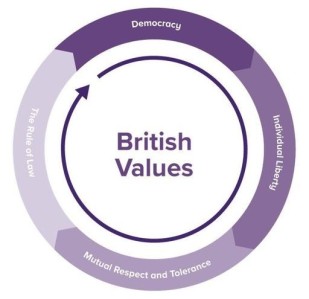British Values

At St Joseph’s Primary School, we promote ‘British Values’ through our spiritual, moral, social and cultural education and our distinctly Catholic ethos, which permeates through the schools’ curriculum and supports the development of the ‘whole child’. We recognise that such development is most successful when those values and attitudes are promoted by all the staff and provide a model of behaviour for our pupils.
“We want every school to promote the basic British Values of democracy, the rule of law, individual liberty, and mutual respect and tolerance for those of different faiths and beliefs.” Lord Nash
| Promoting British Values at St. Josephs’ School | ||
| British Value | What we do | How we do it |
| Democracy |
|
|
| Rule of Law |
|
|
| Individual Liberty |
|
|
| Mutual Respect |
|
|
| Tolerance of those of different faiths and beliefs |
|
|
 St Joseph's Catholic
St Joseph's Catholic